We compiled lecture videos about Solutions. Subtopics covered: (1) Solute & Solvent, (2) Solubility, (3) Concentration, (4) Unsaturated, Saturated & Supersaturated Solutions, and (5) CALCULATION of Concentrations.
Read More[CHEMISTRY MODULE] Pure Substance & Mixtures
We compiled lecture videos about Types of Matter: Pure substances and Mixtures. Subtopics: Types of Mixtures (Homogeneous and Heterogeneous Mixtures) and some SAMPLE PROBLEMS applying concepts of mixtures.
Read More[BIOLOGY LABS] Probing Different Stages of Cell Division Using Onion Shoot (Meiosis) & Roots (Mitosis)

We compiled videos of laboratory experiments for visually probing the Different Stages of Cell Division Using Onion Shoot (Meiosis) & Roots (Mitosis). NOTE: FilSciHub DOES NOT recommend the conduct of these experiments at home. Lab safety practices should be observed at all times.
REVIEW: Mitosis & Meiosis
Mitosis and Meiosis Demo using Beads
Mitosis in Onion Roots
Meiosis in Onion Shoot
[BIOLOGY TEACHING Module] Classification of Plants
[BIO TEACHING MODULE] Heredity: Inheritance and Variation
Central Dogma: Flow of information from DNA to proteins: www.filscihub.com/community/blogpost-bio-module-central-dogma
Mutations and Abnormalities: www.filscihub.com/community/blogpost-bio-module-mutation-abnormalities
We also curated a PROBLEM SET that can be be used for class ASSESSMENT. You can access the PROBLEM SET and ANSWER KEY via the following LINK: www.filscihub.com/community/blogpost-bio-module-central-dogma-quiz.
Genetic Engineering: www.filscihub.com/community/blogpost-bio-module-genetic-engineering
Applications of Recombinant DNA: Vaccines, Gene Therapy, DNA fingerprinting & Genetically Modified Organisms (GMO): www.filscihub.com/community/blogpost-bio-module-taxonomy-domains-kingdoms-sn62x
We also curated a PROBLEM SET that can be be used for class ASSESSMENT. You can access the PROBLEM SET and ANSWER KEY via the following LINK: www.filscihub.com/community/blogpost-bio-module-gene-eng-ps.
[BIO TEACHING MODULE] Classifying Organisms - Taxonomy
[BIO TEACHING MODULE] Relationship between population growth and carrying capacity
PROBLEM SET: Relationship between population growth and carrying capacity.
[BIO TEACHING MODULE] Cellular Reproduction & Genetics
[CHEMISTRY MODULE] Nuclear Chemistry: The Nucleus, Radioactivity & The Genius of Marie Curie
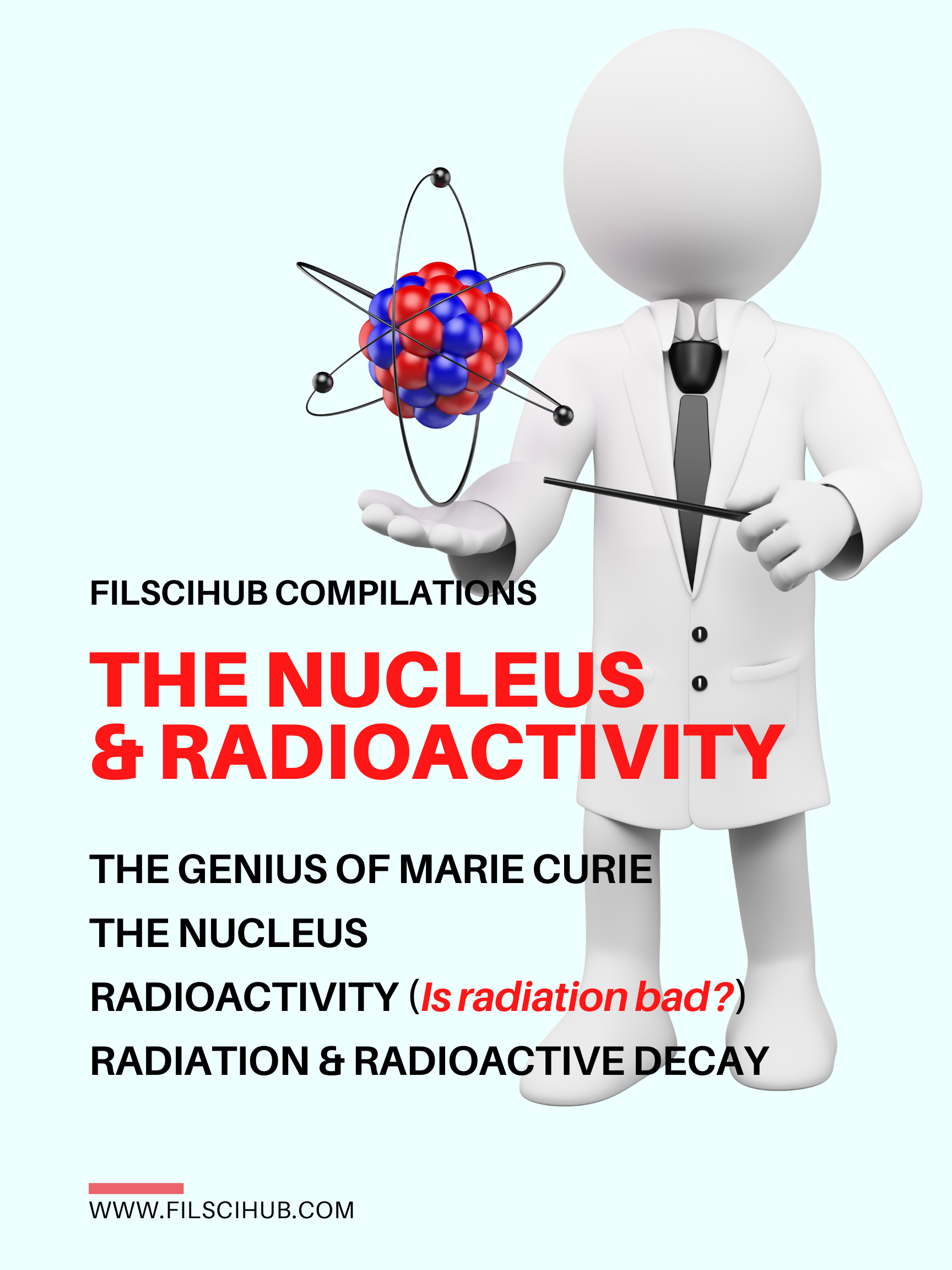
We compiled lecture videos about Nuclear Chemistry. Subtopics: The Nucleus, Radioactivity and the Genius of Marie Curie.
The Genius of Marie Curie
View full lesson: http://ed.ted.com/lessons/the-genius-of-marie-curie-shohini-ghose Marie Skłodowska Curie's revolutionary research laid the groundwork for o...
The Nucleus
Hank does his best to convince us that chemistry is not torture, but is instead the amazing and beautiful science of stuff. Chemistry can tell us how three t...
In this episode, Hank welcomes you to the new age, to the new age, welcome to the new age. Here he'll talk about transmutation among elements, isotopes, calc...
Radioactivity
View full lesson: http://ed.ted.com/lessons/radioactivity-expect-the-unexpected-steve-weatherall Neutrons don't change into protons. Except, sometimes, they ...
Is Radioactivity Bad?
View full lesson: http://ed.ted.com/lessons/is-radiation-dangerous-matt-anticole When we hear the word radiation, it's tempting to picture huge explosions an...
Radiation & Radioactive Decay
Mr. Andersen explains why radiation occurs and describes the major types of radiation. He also shows how alpha, beta, and gamma radiation affect the nucleus ...
PROBLEM SET: Relationship between population growth and carrying capacity.
[BIOLOGY TEACHING Module] Classification of Plants
[BIO TEACHING MODULE] Heredity: Inheritance and Variation
Central Dogma: Flow of information from DNA to proteins: www.filscihub.com/community/blogpost-bio-module-central-dogma
Mutations and Abnormalities: www.filscihub.com/community/blogpost-bio-module-mutation-abnormalities
We also curated a PROBLEM SET that can be be used for class ASSESSMENT. You can access the PROBLEM SET and ANSWER KEY via the following LINK: www.filscihub.com/community/blogpost-bio-module-central-dogma-quiz.
Genetic Engineering: www.filscihub.com/community/blogpost-bio-module-genetic-engineering
Applications of Recombinant DNA: Vaccines, Gene Therapy, DNA fingerprinting & Genetically Modified Organisms (GMO): www.filscihub.com/community/blogpost-bio-module-taxonomy-domains-kingdoms-sn62x
We also curated a PROBLEM SET that can be be used for class ASSESSMENT. You can access the PROBLEM SET and ANSWER KEY via the following LINK: www.filscihub.com/community/blogpost-bio-module-gene-eng-ps.
[BIO TEACHING MODULE] Classifying Organisms - Taxonomy
[BIO TEACHING MODULE] Relationship between population growth and carrying capacity
PROBLEM SET: Relationship between population growth and carrying capacity.
[BIO TEACHING MODULE] Cellular Reproduction & Genetics
[CHEMISTRY MODULE] Isotopes: What is an Isotope? Isotopes and Average Atomic Mass (Practice Problems included).

We compiled lecture videos about Isotopes. Subtopics: Definition of Isotopes, Isotopes and Average Atomic Mass (Practice Problems included).
REVIEW: Atomic number & atomic mass
How to use the atomic number and the mass number to represent different isotopes Watch the next lesson: https://www.khanacademy.org/science/chemistry/atomic-...
What is an Isotope?
What are Isotopes? Find out in this video from the Properties of Matter chapter. 00:00:02,590 -- 00:00:07,319 In a previous video we learnt about Isotopes. H...
Isotopes vs Ions?
To understand the difference between isotopes and ions we first look to their definitions. Isotopes are versions of a particular element that have different ...
Isotopes and Average Atomic Mass
Visit Study.com for thousands more videos like this one. You'll get full access to our interactive quizzes and transcripts and can find out how to use our vi...
How to Calculate Atomic Mass Practice Problems
To see all my Chemistry videos, check out http://socratic.org/chemistry How do you calculate atomic mass? You have to multiply the atomic weight of an atom (...
PROBLEM SET: Relationship between population growth and carrying capacity.
[BIOLOGY TEACHING Module] Classification of Plants
[BIO TEACHING MODULE] Heredity: Inheritance and Variation
Central Dogma: Flow of information from DNA to proteins: www.filscihub.com/community/blogpost-bio-module-central-dogma
Mutations and Abnormalities: www.filscihub.com/community/blogpost-bio-module-mutation-abnormalities
We also curated a PROBLEM SET that can be be used for class ASSESSMENT. You can access the PROBLEM SET and ANSWER KEY via the following LINK: www.filscihub.com/community/blogpost-bio-module-central-dogma-quiz.
Genetic Engineering: www.filscihub.com/community/blogpost-bio-module-genetic-engineering
Applications of Recombinant DNA: Vaccines, Gene Therapy, DNA fingerprinting & Genetically Modified Organisms (GMO): www.filscihub.com/community/blogpost-bio-module-taxonomy-domains-kingdoms-sn62x
We also curated a PROBLEM SET that can be be used for class ASSESSMENT. You can access the PROBLEM SET and ANSWER KEY via the following LINK: www.filscihub.com/community/blogpost-bio-module-gene-eng-ps.
[BIO TEACHING MODULE] Classifying Organisms - Taxonomy
[BIO TEACHING MODULE] Relationship between population growth and carrying capacity
PROBLEM SET: Relationship between population growth and carrying capacity.
[BIO TEACHING MODULE] Cellular Reproduction & Genetics
[GENERAL SCIENCE LABS] Design of Experiments: Characteristic of Well-Designed Experiments, Independent vs Dependent Variables
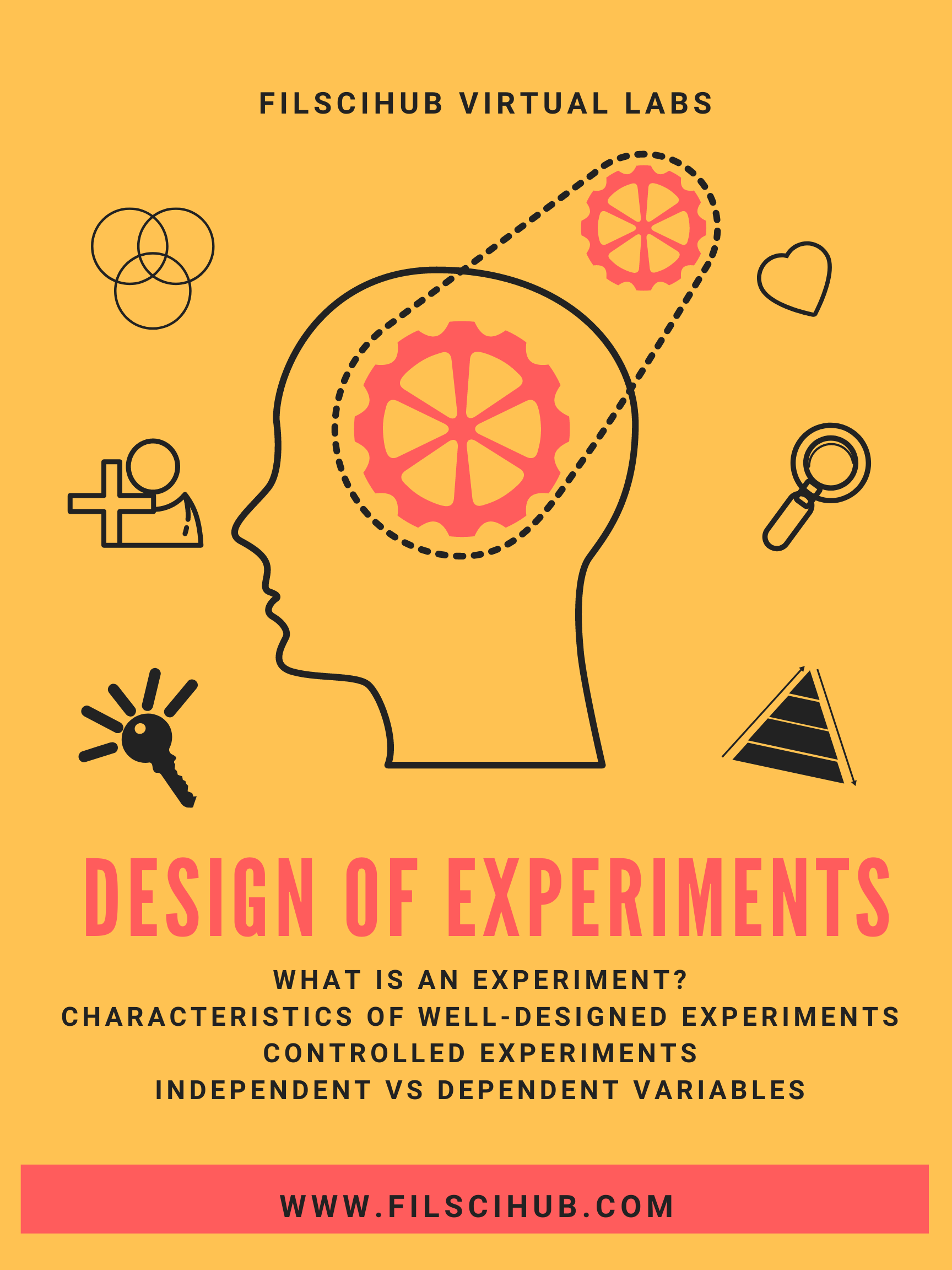
We compiled videos about Design of Experiments. Specifically, the videos present the Characteristic of Well-Designed Experiments, Independent vs Dependent Variables.
Experimental Design
Visit Study.com for thousands more videos like this one. You'll get full access to our interactive quizzes and transcripts and can find out how to use our vi...
Introduction to experiment design. Creating a hypothesis. Double-blind testing. Placebo effect. View more lessons or practice this subject at https://www.kha...
Controlled Experiments: Independent vs Dependent Variables
This animation describes the process of conducting a controlled experiment. This is the first video in a two-part series. Watch the second video, "Independen...
This animation describes the difference between independent variables and dependent variables as they relate to biology. This is the second video in a two-pa...
PROBLEM SET: Relationship between population growth and carrying capacity.
[BIOLOGY TEACHING Module] Classification of Plants
[BIO TEACHING MODULE] Heredity: Inheritance and Variation
Central Dogma: Flow of information from DNA to proteins: www.filscihub.com/community/blogpost-bio-module-central-dogma
Mutations and Abnormalities: www.filscihub.com/community/blogpost-bio-module-mutation-abnormalities
We also curated a PROBLEM SET that can be be used for class ASSESSMENT. You can access the PROBLEM SET and ANSWER KEY via the following LINK: www.filscihub.com/community/blogpost-bio-module-central-dogma-quiz.
Genetic Engineering: www.filscihub.com/community/blogpost-bio-module-genetic-engineering
Applications of Recombinant DNA: Vaccines, Gene Therapy, DNA fingerprinting & Genetically Modified Organisms (GMO): www.filscihub.com/community/blogpost-bio-module-taxonomy-domains-kingdoms-sn62x
We also curated a PROBLEM SET that can be be used for class ASSESSMENT. You can access the PROBLEM SET and ANSWER KEY via the following LINK: www.filscihub.com/community/blogpost-bio-module-gene-eng-ps.
[BIO TEACHING MODULE] Classifying Organisms - Taxonomy
[BIO TEACHING MODULE] Relationship between population growth and carrying capacity
PROBLEM SET: Relationship between population growth and carrying capacity.
[BIO TEACHING MODULE] Cellular Reproduction & Genetics
[BIOLOGY LABS] Biomolecules (Food Tests to Detect Carbohydrates, Proteins, Lipids & Enzymes).

We compiled videos of laboratory experiments for visually identifying Biomolecules (Food Tests to Detect Carbohydrates, Proteins, Lipids & Enzymes).
NOTE: FilSciHub DOES NOT recommend the conduct of these experiments at home. Lab safety practices should be observed at all times.
REVIEW: Biomolecules
This video, as stated in the description, focuses on general functions of biomolecules. The biomolecules: carbs, lipids, proteins, and nucleic acids, can all...
Food tests to Identify Biomolecules
Here's our very own investigation for the identification of the biological molecules protein, starch, glucose and a non-reducing sugar. All the experiments w...
Flipped learning lesson on this food tests lab HERE: http://sciencesauceonline.com/bio/food-tests/ Follow me on Instagram: https://www.instagram.com/sciences...
FilSciHub’s Starch Test (1-Minute Videos)
Starch and Iodine Test (Chemistry Experiment) - One minute of Science
FilSciHub’s Enzyme Experiment
This is a way to study enzymes using potatoes!
PROBLEM SET: Relationship between population growth and carrying capacity.
[BIOLOGY TEACHING Module] Classification of Plants
[BIO TEACHING MODULE] Heredity: Inheritance and Variation
Central Dogma: Flow of information from DNA to proteins: www.filscihub.com/community/blogpost-bio-module-central-dogma
Mutations and Abnormalities: www.filscihub.com/community/blogpost-bio-module-mutation-abnormalities
We also curated a PROBLEM SET that can be be used for class ASSESSMENT. You can access the PROBLEM SET and ANSWER KEY via the following LINK: www.filscihub.com/community/blogpost-bio-module-central-dogma-quiz.
Genetic Engineering: www.filscihub.com/community/blogpost-bio-module-genetic-engineering
Applications of Recombinant DNA: Vaccines, Gene Therapy, DNA fingerprinting & Genetically Modified Organisms (GMO): www.filscihub.com/community/blogpost-bio-module-taxonomy-domains-kingdoms-sn62x
We also curated a PROBLEM SET that can be be used for class ASSESSMENT. You can access the PROBLEM SET and ANSWER KEY via the following LINK: www.filscihub.com/community/blogpost-bio-module-gene-eng-ps.
[BIO TEACHING MODULE] Classifying Organisms - Taxonomy
[BIO TEACHING MODULE] Relationship between population growth and carrying capacity
PROBLEM SET: Relationship between population growth and carrying capacity.
[BIO TEACHING MODULE] Cellular Reproduction & Genetics
[BIOLOGY MODULE] Biomolecules (Advanced Discussions)
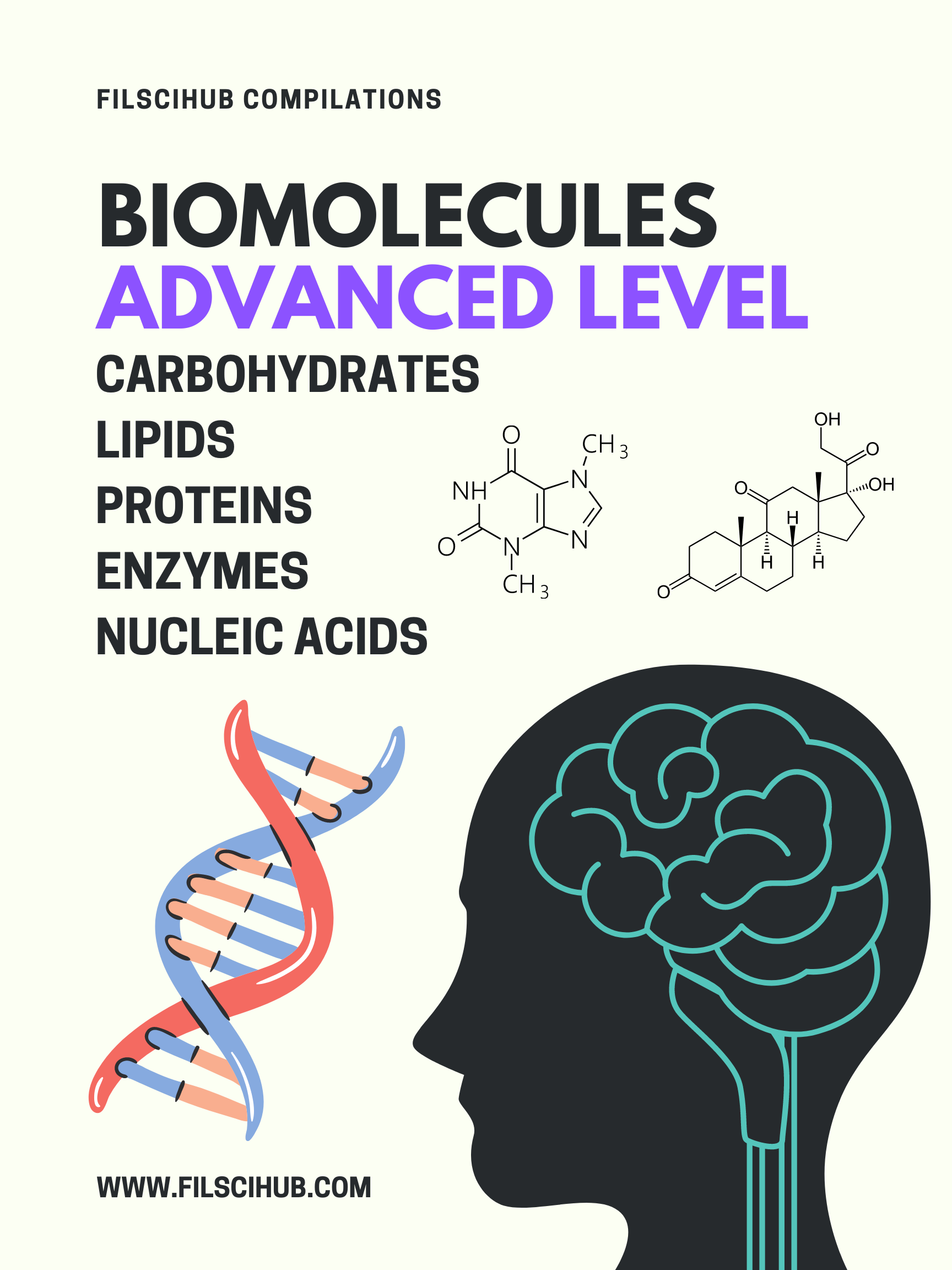
We compiled lecture videos to Introduce students to Biomolecules. This module covers advanced video lectures about biomolecules..
Advanced Discussion: Biomolecules
042 - Biological Molecules Paul Andersen describes the four major biological molecules found in living things. He begins with a brief discussion of polymeriz...
Paul Andersen describes the macromolecules that make up living organisms. He starts with a brief description of organic chemistry and the importance of funct...
PROBLEM SET: Relationship between population growth and carrying capacity.
[BIOLOGY TEACHING Module] Classification of Plants
[BIO TEACHING MODULE] Heredity: Inheritance and Variation
Central Dogma: Flow of information from DNA to proteins: www.filscihub.com/community/blogpost-bio-module-central-dogma
Mutations and Abnormalities: www.filscihub.com/community/blogpost-bio-module-mutation-abnormalities
We also curated a PROBLEM SET that can be be used for class ASSESSMENT. You can access the PROBLEM SET and ANSWER KEY via the following LINK: www.filscihub.com/community/blogpost-bio-module-central-dogma-quiz.
Genetic Engineering: www.filscihub.com/community/blogpost-bio-module-genetic-engineering
Applications of Recombinant DNA: Vaccines, Gene Therapy, DNA fingerprinting & Genetically Modified Organisms (GMO): www.filscihub.com/community/blogpost-bio-module-taxonomy-domains-kingdoms-sn62x
We also curated a PROBLEM SET that can be be used for class ASSESSMENT. You can access the PROBLEM SET and ANSWER KEY via the following LINK: www.filscihub.com/community/blogpost-bio-module-gene-eng-ps.
[BIO TEACHING MODULE] Classifying Organisms - Taxonomy
[BIO TEACHING MODULE] Relationship between population growth and carrying capacity
PROBLEM SET: Relationship between population growth and carrying capacity.
[BIO TEACHING MODULE] Cellular Reproduction & Genetics
[BIOLOGY MODULE] Biomolecules Part 2: Proteins, Enzymes & Nucleic Acids

We compiled lecture videos to Introduce students to Biomolecules. This module coverProteins, Enzymes & Nucleic Acids.
Proteins
Learn about all the macromolecules and more at https://www.2minuteclassroom.com/macromolecules The simplest explanation of protein structure and function to ...
Introduction to proteins as polymers of amino acids (monomers). View more lessons or practice this subject at https://www.khanacademy.org/science/high-school...
Enzymes
Enzymes are really important proteins, that speed up the rates of reactions such as in photosynthesis, respiration and protein synthesis. The enzymes and sub...
Enzymes as catalysts for reactions in biological systems; discussion of substrates, active sites, induced fit, and activation energy. Watch the next lesson: ...
Nucleic Acids
Nucleic acids DNA and RNA structure LIKE US ON FACEBOOK : https://fb.me/Medsimplified Nucleic acids are biopolymers, or small biomolecules, essential to all ...
Introduction to nucleic acids (e.g., DNA and RNA) and nucleotides. View more lessons or practice this subject at https://www.khanacademy.org/science/high-sch...
PROBLEM SET: Relationship between population growth and carrying capacity.
[BIOLOGY TEACHING Module] Classification of Plants
[BIO TEACHING MODULE] Heredity: Inheritance and Variation
Central Dogma: Flow of information from DNA to proteins: www.filscihub.com/community/blogpost-bio-module-central-dogma
Mutations and Abnormalities: www.filscihub.com/community/blogpost-bio-module-mutation-abnormalities
We also curated a PROBLEM SET that can be be used for class ASSESSMENT. You can access the PROBLEM SET and ANSWER KEY via the following LINK: www.filscihub.com/community/blogpost-bio-module-central-dogma-quiz.
Genetic Engineering: www.filscihub.com/community/blogpost-bio-module-genetic-engineering
Applications of Recombinant DNA: Vaccines, Gene Therapy, DNA fingerprinting & Genetically Modified Organisms (GMO): www.filscihub.com/community/blogpost-bio-module-taxonomy-domains-kingdoms-sn62x
We also curated a PROBLEM SET that can be be used for class ASSESSMENT. You can access the PROBLEM SET and ANSWER KEY via the following LINK: www.filscihub.com/community/blogpost-bio-module-gene-eng-ps.
[BIO TEACHING MODULE] Classifying Organisms - Taxonomy
[BIO TEACHING MODULE] Relationship between population growth and carrying capacity
PROBLEM SET: Relationship between population growth and carrying capacity.
[BIO TEACHING MODULE] Cellular Reproduction & Genetics
[BIOLOGY MODULE] Biomolecules Part 1: Carbohydrates and Lipids

We compiled lecture videos to Introduce students to Biomolecules. This module covers both Carbohydrates and Lipids..
Introduction to Biomolecules
Hank talks about the molecules that make up every living thing - carbohydrates, lipids, and proteins - and how we find them in our environment and in the foo...
Molecules make you think of chemistry, right? Well, they also are very important in biology too. In this video we are going to look at carbohydrates, protein...
Carbohydrates
Introduction to carbohydrates (saccharides). Monomers and polymers. Glucose and glycogen. View more lessons or practice this subject at https://www.khanacade...
Lipids
In this video Paul Andersen describes the lipids (of the fats). He explains how they are an important source of energy but are also required to cell membrane...
PROBLEM SET: Relationship between population growth and carrying capacity.
[BIOLOGY TEACHING Module] Classification of Plants
[BIO TEACHING MODULE] Heredity: Inheritance and Variation
Central Dogma: Flow of information from DNA to proteins: www.filscihub.com/community/blogpost-bio-module-central-dogma
Mutations and Abnormalities: www.filscihub.com/community/blogpost-bio-module-mutation-abnormalities
We also curated a PROBLEM SET that can be be used for class ASSESSMENT. You can access the PROBLEM SET and ANSWER KEY via the following LINK: www.filscihub.com/community/blogpost-bio-module-central-dogma-quiz.
Genetic Engineering: www.filscihub.com/community/blogpost-bio-module-genetic-engineering
Applications of Recombinant DNA: Vaccines, Gene Therapy, DNA fingerprinting & Genetically Modified Organisms (GMO): www.filscihub.com/community/blogpost-bio-module-taxonomy-domains-kingdoms-sn62x
We also curated a PROBLEM SET that can be be used for class ASSESSMENT. You can access the PROBLEM SET and ANSWER KEY via the following LINK: www.filscihub.com/community/blogpost-bio-module-gene-eng-ps.
[BIO TEACHING MODULE] Classifying Organisms - Taxonomy
[BIO TEACHING MODULE] Relationship between population growth and carrying capacity
PROBLEM SET: Relationship between population growth and carrying capacity.
[BIO TEACHING MODULE] Cellular Reproduction & Genetics
[BIOLOGY MODULE] Cell Transport Mechanisms: Active, Passive and Bulk TRansport

We compiled lecture videos to Introduce students to Cell Transport Mechanisms: Active, Passive and Bulk Transport.
Introduction to Cell Transport
How do things move across the cell membrane, either in or out? This animation shows two broad categories of how things pass into or out of a cell: passive tr...
Explore the types of passive and active cell transport with the Amoeba Sisters! This video has a handout here: http://www.amoebasisters.com/handouts.html Exp...
Active and Passive Transport
Introduction to passive and active transport. View more lessons or practice this subject at https://www.khanacademy.org/science/high-school-biology/hs-energy...
This short video gives an overview of active, passive and bulk transport. Diffusion, facilitated diffusion, osmosis, cell pumps, endocytosis, pinocytosis, re...
Bulk Transport
This video explains about the process of bulk transport through the plasma membrane through various processes such as - endocytosis, phagocytosis and exocyto...
PROBLEM SET: Relationship between population growth and carrying capacity.
[BIOLOGY TEACHING Module] Classification of Plants
[BIO TEACHING MODULE] Heredity: Inheritance and Variation
Central Dogma: Flow of information from DNA to proteins: www.filscihub.com/community/blogpost-bio-module-central-dogma
Mutations and Abnormalities: www.filscihub.com/community/blogpost-bio-module-mutation-abnormalities
We also curated a PROBLEM SET that can be be used for class ASSESSMENT. You can access the PROBLEM SET and ANSWER KEY via the following LINK: www.filscihub.com/community/blogpost-bio-module-central-dogma-quiz.
Genetic Engineering: www.filscihub.com/community/blogpost-bio-module-genetic-engineering
Applications of Recombinant DNA: Vaccines, Gene Therapy, DNA fingerprinting & Genetically Modified Organisms (GMO): www.filscihub.com/community/blogpost-bio-module-taxonomy-domains-kingdoms-sn62x
We also curated a PROBLEM SET that can be be used for class ASSESSMENT. You can access the PROBLEM SET and ANSWER KEY via the following LINK: www.filscihub.com/community/blogpost-bio-module-gene-eng-ps.
[BIO TEACHING MODULE] Classifying Organisms - Taxonomy
[BIO TEACHING MODULE] Relationship between population growth and carrying capacity
PROBLEM SET: Relationship between population growth and carrying capacity.
[BIO TEACHING MODULE] Cellular Reproduction & Genetics
[CHEMISTRY MODULE] Mole Concept: How big is a mole? Mass-Mole-Number of Particle Conversion & Practice Problems

We compiled lecture videos for introducing students to the Environmental Science (Intro) and Materials Cycle. Subtopics: The Hydrologic and Carbon Cycles, and Nitrogen and Phosphorus Cycles.
REVIEW: Law of Conservation of Mass
View full lesson: http://ed.ted.com/lessons/the-law-of-conservation-of-mass-todd-ramsey Everything in our universe has mass - from the smallest atom to the l...
How big is a mole?
A mole is like a dozen. It is a name for a specific number of things. There are 12 things in a dozen, and 602 hexillion things in a mole. We'll talk about wh...
View full lesson here: http://ed.ted.com/lessons/daniel-dulek-how-big-is-a-mole-not-the-animal-the-other-one The word "mole" suggests a small, furry burrowin...
We'll learn how to use moles to figure out how many atoms you have in something. If there are 602 hexillion things in a mole, how do you count them all? By u...
Avogadro’s Number
To learn more about Mole, enroll in our full course now: https://bit.ly/AllAboutAtoms In this video, we will learn: 0:00 Concept of Mole 0:30 Definition of a...
To learn more about Atoms and Molecules, enroll in our full course now: https://bit.ly/AllAboutAtoms In this video, we will learn: 0:00 Introduction 0:59 Con...
Stoichiometry
Chemists need stoichiometry to make the scale of chemistry more understandable - Hank is here to explain why, and to teach us how to use it. Pssst... we made...
Mole-Mass-Particle Number Conversions
Mr. Andersen shows you how to convert moles to grams and moles to molecules. Intro Music Atribution Title: I4dsong_loop_main.wav Artist: CosmicD Link to soun...
How many atoms in 5.5 moles? How many moles is 4.6 x 10^24 sulfur atoms? We'll solve problems like these, where we convert back and forth between moles and t...
Kickoff Session: Masterclass in Teaching Essential Math and Science High School Content
Back to Math Basics Session 3: Introduction to Calculus - Limits Part 2 (eCertificate)
One-Sided Limits
Existence of (two-sided) Limit
Limits at Infinity
Kickoff Session: Masterclass in Teaching Essential Math and Science High School Content
Back to Math Basics Session 3: Introduction to Calculus - Limits Part 1 (eCertificate)
Intuitive Notion of Limits
Rules on Evaluating Limits
Limits of Indeterminate Forms (using Factoring and/or Rationalizing the Expression)
To those who missed the LIVE session, you may watch the recorded tutorial via YouTube Live Streaming
Seminar Series: STEM Pedagogies for Special Education Students
Featuring teachers Carlisle Macahig and Maritess Andres.
This webinar series is for Pre-Service SPED Teachers, Teachers integrating SPED students in regular class, and Parents of SPED students
Back to Math Basics Session 5: Introduction to Calculus - Continuity of Functions
Continuity at a Number
Continuity of Polynomial and Rational Functions
Continuity of Transcendental Functions
Continuity on an Interval
Back to Math Basics Session 4: Introduction to Calculus - Limits Part 2
One-Sided Limits
Existence of (two-sided) Limit
Limits at Infinity
Back to Math Basics Session 3: Introduction to Calculus - Limits Part 1
Intuitive Notion of Limits
Rules on Evaluating Limits
Limits of Indeterminate Forms (using Factoring and/or Rationalizing the Expression)
Pedagogies in Teaching Math to Special Education Students - eCertificate
Featuring: Carlisle Cañete-Macahig, Teacher III, DepEd-Negros Oriental, Bacong Central School, Master of Arts in Special Education
Back to Math Basics - VECTORS
Featuring Jaysie Mher Tiongson, M.Sc. Assistant Professor, University of the Philippines
FREE online tutorial sessions for students and teachers Learn the basics and applications of Math Build essential skills you can apply in different fields
First Topic: VECTORS
Session 1: Dec 8, 9:30AM, Manila
Session 2: Jan 4, 9:30AM, Manila
a Zoom & Youtube live event
[ENVIRONMENTAL SCIENCE] Environmental Science (Intro) and Materials Cycle

We compiled lecture videos for introducing students to the Environmental Science (Intro) and Materials Cycle. Subtopics: The Hydrologic and Carbon Cycles, and Nitrogen and Phosphorus Cycles.
INTRO: Earth Science
001 - Environmental Science In this video Paul Andersen outlines the AP Environmental Science course. He explains how environmental science studies the inter...
Materials Cycle
Matter cycles through the ecosystem, linking the biotic and abiotic components. The Carbon Cycle and Nitrogen Cycle can be used to illustrate the flow of mat...
Biogeochemical Cycles
011 - Biogeochemical Cycles In this video Paul Andersen explains how biogeochemical cycles move required nutrients through the abiotic and biotic spheres on ...
The Hydrologic and Carbon Cycles
Hank introduces us to biogeochemical cycles by describing his two favorites: carbon and water. The hydrologic cycle describes how water moves on, above, and ...
Nitrogen & Phosphorus Cycles
Hank describes the desperate need many organisms have for nutrients (specifically nitrogen and phosphorus) and how they go about getting them via the nitroge...
Kickoff Session: Masterclass in Teaching Essential Math and Science High School Content
Back to Math Basics Session 3: Introduction to Calculus - Limits Part 2 (eCertificate)
One-Sided Limits
Existence of (two-sided) Limit
Limits at Infinity
Kickoff Session: Masterclass in Teaching Essential Math and Science High School Content
Back to Math Basics Session 3: Introduction to Calculus - Limits Part 1 (eCertificate)
Intuitive Notion of Limits
Rules on Evaluating Limits
Limits of Indeterminate Forms (using Factoring and/or Rationalizing the Expression)
To those who missed the LIVE session, you may watch the recorded tutorial via YouTube Live Streaming
Seminar Series: STEM Pedagogies for Special Education Students
Featuring teachers Carlisle Macahig and Maritess Andres.
This webinar series is for Pre-Service SPED Teachers, Teachers integrating SPED students in regular class, and Parents of SPED students
Back to Math Basics Session 5: Introduction to Calculus - Continuity of Functions
Continuity at a Number
Continuity of Polynomial and Rational Functions
Continuity of Transcendental Functions
Continuity on an Interval
Back to Math Basics Session 4: Introduction to Calculus - Limits Part 2
One-Sided Limits
Existence of (two-sided) Limit
Limits at Infinity
Back to Math Basics Session 3: Introduction to Calculus - Limits Part 1
Intuitive Notion of Limits
Rules on Evaluating Limits
Limits of Indeterminate Forms (using Factoring and/or Rationalizing the Expression)
Pedagogies in Teaching Math to Special Education Students - eCertificate
Featuring: Carlisle Cañete-Macahig, Teacher III, DepEd-Negros Oriental, Bacong Central School, Master of Arts in Special Education
Back to Math Basics - VECTORS
Featuring Jaysie Mher Tiongson, M.Sc. Assistant Professor, University of the Philippines
FREE online tutorial sessions for students and teachers Learn the basics and applications of Math Build essential skills you can apply in different fields
First Topic: VECTORS
Session 1: Dec 8, 9:30AM, Manila
Session 2: Jan 4, 9:30AM, Manila
a Zoom & Youtube live event
[BIOLOGY MODULE] Introduction to Cell Cycle, Mitosis & Meiosis, Importance of Cell Division & Related Diseases/Disorders

We compiled lecture videos to Introduce the Cell Cycle, Mitosis & Meiosis, Importance of Cell Division & Related Diseases/Disorders.
Introduction to Cell Cycle
We have seen a caterpillar turning into a butterfly, a small baby growing into an adult and many such transitions in nature! Ever wondered how does a little ...
Mitosis and Meiosis
Mr. Andersen uses chromosome beads to simulate both mitosis and meiosis. A brief discussion of gamete formation is also included. Do you speak another langua...
Advanced lectures on Mitosis and Meiosis
Hank describes mitosis and cytokinesis - the series of processes our cells go through to divide into two identical copies. Crash Course Biology is now availa...
028 - Cell Cycle, Mitosis and Meiosis Paul Andersen explains how the cell cycle is used to create new cells. The creation of identical diploid daughter cells...
Importance of Cell Division
This video examines the importance of cell division to growth and repair.
Cell Division Disorders
Enjoy the videos and music you love, upload original content, and share it all with friends, family, and the world on YouTube.
PROBLEM SET: Relationship between population growth and carrying capacity.
[BIOLOGY TEACHING Module] Classification of Plants
[BIO TEACHING MODULE] Heredity: Inheritance and Variation
Central Dogma: Flow of information from DNA to proteins: www.filscihub.com/community/blogpost-bio-module-central-dogma
Mutations and Abnormalities: www.filscihub.com/community/blogpost-bio-module-mutation-abnormalities
We also curated a PROBLEM SET that can be be used for class ASSESSMENT. You can access the PROBLEM SET and ANSWER KEY via the following LINK: www.filscihub.com/community/blogpost-bio-module-central-dogma-quiz.
Genetic Engineering: www.filscihub.com/community/blogpost-bio-module-genetic-engineering
Applications of Recombinant DNA: Vaccines, Gene Therapy, DNA fingerprinting & Genetically Modified Organisms (GMO): www.filscihub.com/community/blogpost-bio-module-taxonomy-domains-kingdoms-sn62x
We also curated a PROBLEM SET that can be be used for class ASSESSMENT. You can access the PROBLEM SET and ANSWER KEY via the following LINK: www.filscihub.com/community/blogpost-bio-module-gene-eng-ps.
[BIO TEACHING MODULE] Classifying Organisms - Taxonomy
[BIO TEACHING MODULE] Relationship between population growth and carrying capacity
PROBLEM SET: Relationship between population growth and carrying capacity.
[BIO TEACHING MODULE] Cellular Reproduction & Genetics
[CHEMISTRY MODULE] Introduction to the Periodic Table and Trends in the Properties of Elements
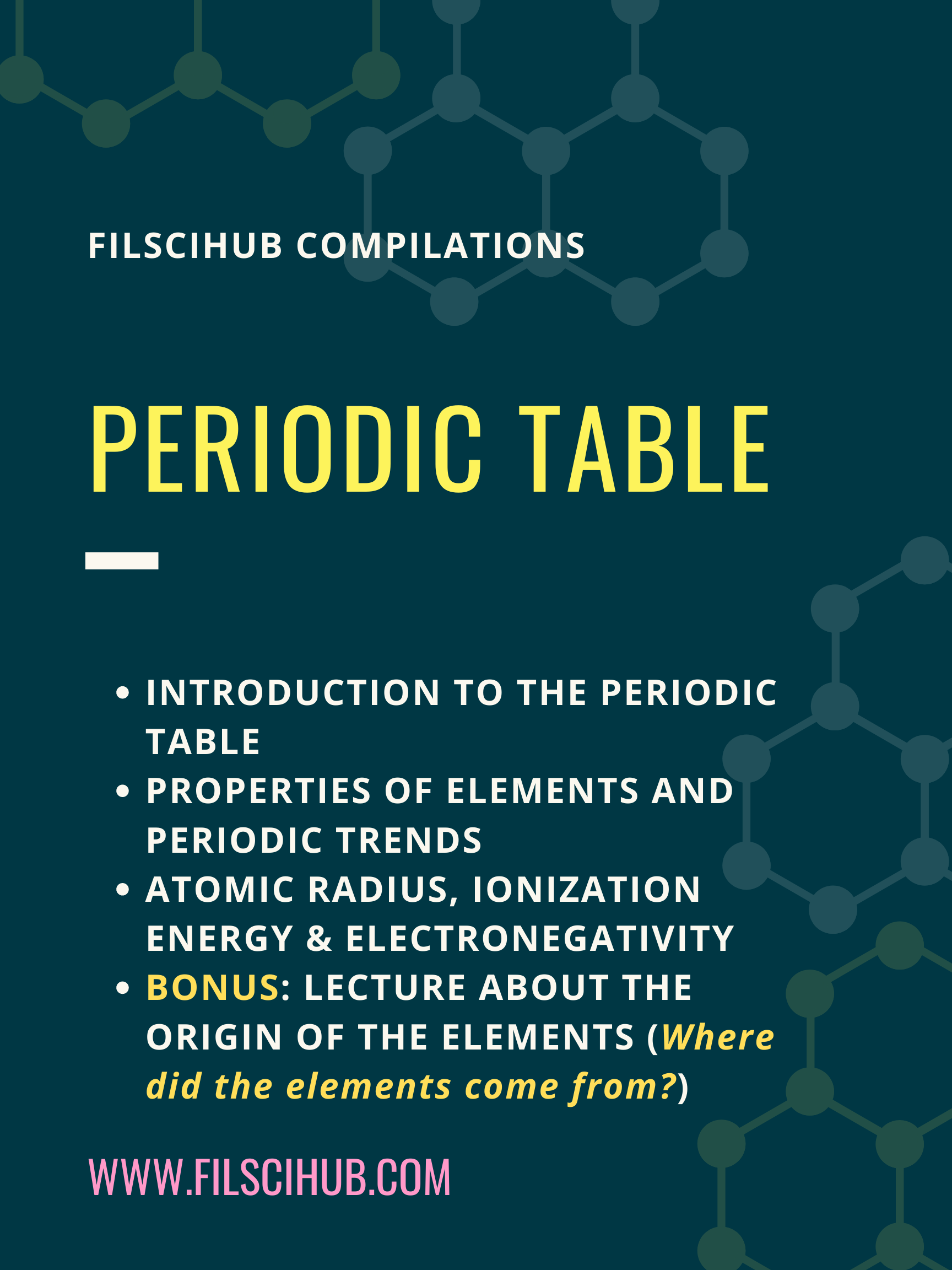
We compiled lecture videos for introducing students to the Periodic Table and Trends in the Properties of Elements. We also added a lecture about the Origin of the Elements for advanced-level chemistry classes!
INTRODUCTION to the Periodic Table
Chemistry: Introduction to the Periodic Table The periodic table is the most powerful tool chemists have for organizing chemical information. Without it, che...
Hank gives us a tour of the most important table ever, including the life story of the obsessive man who championed it, Dmitri Mendeleev. The periodic table ...
Trends in the Periodic Table
Across the periodic table, we can elucidate trends (patterns) in atomic properties. In this video, we examine trends for three properties: atomic radius, ion...
Why is the periodic table arranged the way it is? There are specific reasons, you know. Because of the way we organize the elements, there are special patter...
BONUS: Lecture about the Origin of the Elements (Recommended for Advanced Level Chem Classes)
The world around us is made of atoms. Did you ever wonder where these atoms came from? How was the gold in our jewelry, the carbon in our bodies, and the iro...
Kickoff Session: Masterclass in Teaching Essential Math and Science High School Content
Back to Math Basics Session 3: Introduction to Calculus - Limits Part 2 (eCertificate)
One-Sided Limits
Existence of (two-sided) Limit
Limits at Infinity
Kickoff Session: Masterclass in Teaching Essential Math and Science High School Content
Back to Math Basics Session 3: Introduction to Calculus - Limits Part 1 (eCertificate)
Intuitive Notion of Limits
Rules on Evaluating Limits
Limits of Indeterminate Forms (using Factoring and/or Rationalizing the Expression)
To those who missed the LIVE session, you may watch the recorded tutorial via YouTube Live Streaming
Seminar Series: STEM Pedagogies for Special Education Students
Featuring teachers Carlisle Macahig and Maritess Andres.
This webinar series is for Pre-Service SPED Teachers, Teachers integrating SPED students in regular class, and Parents of SPED students
Back to Math Basics Session 5: Introduction to Calculus - Continuity of Functions
Continuity at a Number
Continuity of Polynomial and Rational Functions
Continuity of Transcendental Functions
Continuity on an Interval
Back to Math Basics Session 4: Introduction to Calculus - Limits Part 2
One-Sided Limits
Existence of (two-sided) Limit
Limits at Infinity
Back to Math Basics Session 3: Introduction to Calculus - Limits Part 1
Intuitive Notion of Limits
Rules on Evaluating Limits
Limits of Indeterminate Forms (using Factoring and/or Rationalizing the Expression)
Pedagogies in Teaching Math to Special Education Students - eCertificate
Featuring: Carlisle Cañete-Macahig, Teacher III, DepEd-Negros Oriental, Bacong Central School, Master of Arts in Special Education
Back to Math Basics - VECTORS
Featuring Jaysie Mher Tiongson, M.Sc. Assistant Professor, University of the Philippines
FREE online tutorial sessions for students and teachers Learn the basics and applications of Math Build essential skills you can apply in different fields
First Topic: VECTORS
Session 1: Dec 8, 9:30AM, Manila
Session 2: Jan 4, 9:30AM, Manila
a Zoom & Youtube live event
[EARTH SCIENCE] Introduction to Earth Science: What is Earth Science & Why is it Important to Study Earth Science?

We compiled lecture videos for Introduction to Earth Science at the High School level. These materials answer the questions: What is Earth Science & Why is it Important to Study Earth Science?
DEFINITION: Earth Science
A quick look at the field of Earth Science, including the three main areas of study including astronomy, meteorology, and geology. Hey there! My name is Mike...
It's Earth Science time!!!! In this field, natural philosophers were asking questions like, what's up with fossils? Are they the remains of extinct organisms...
Why study Earth Science?
Watch these 10 short videos explaining what we all should know about the science of the Earth - how the planet's land, water, air, and life systems interact....
30-Minute Lecture: Introduction to Earth Science
Additional videos to watch before Lecture 2: Interactive scale of the Universe: http://htwins.net/scale2/ 1) Scale of the Universe video: https://www.youtube...
Kickoff Session: Masterclass in Teaching Essential Math and Science High School Content
Back to Math Basics Session 3: Introduction to Calculus - Limits Part 2 (eCertificate)
One-Sided Limits
Existence of (two-sided) Limit
Limits at Infinity
Kickoff Session: Masterclass in Teaching Essential Math and Science High School Content
Back to Math Basics Session 3: Introduction to Calculus - Limits Part 1 (eCertificate)
Intuitive Notion of Limits
Rules on Evaluating Limits
Limits of Indeterminate Forms (using Factoring and/or Rationalizing the Expression)
To those who missed the LIVE session, you may watch the recorded tutorial via YouTube Live Streaming
Seminar Series: STEM Pedagogies for Special Education Students
Featuring teachers Carlisle Macahig and Maritess Andres.
This webinar series is for Pre-Service SPED Teachers, Teachers integrating SPED students in regular class, and Parents of SPED students
Back to Math Basics Session 5: Introduction to Calculus - Continuity of Functions
Continuity at a Number
Continuity of Polynomial and Rational Functions
Continuity of Transcendental Functions
Continuity on an Interval
Back to Math Basics Session 4: Introduction to Calculus - Limits Part 2
One-Sided Limits
Existence of (two-sided) Limit
Limits at Infinity
Back to Math Basics Session 3: Introduction to Calculus - Limits Part 1
Intuitive Notion of Limits
Rules on Evaluating Limits
Limits of Indeterminate Forms (using Factoring and/or Rationalizing the Expression)
Pedagogies in Teaching Math to Special Education Students - eCertificate
Featuring: Carlisle Cañete-Macahig, Teacher III, DepEd-Negros Oriental, Bacong Central School, Master of Arts in Special Education
Back to Math Basics - VECTORS
Featuring Jaysie Mher Tiongson, M.Sc. Assistant Professor, University of the Philippines
FREE online tutorial sessions for students and teachers Learn the basics and applications of Math Build essential skills you can apply in different fields
First Topic: VECTORS
Session 1: Dec 8, 9:30AM, Manila
Session 2: Jan 4, 9:30AM, Manila
a Zoom & Youtube live event
[CHEMISTRY MODULE] Physical and Chemical Changes: Definition and Examples
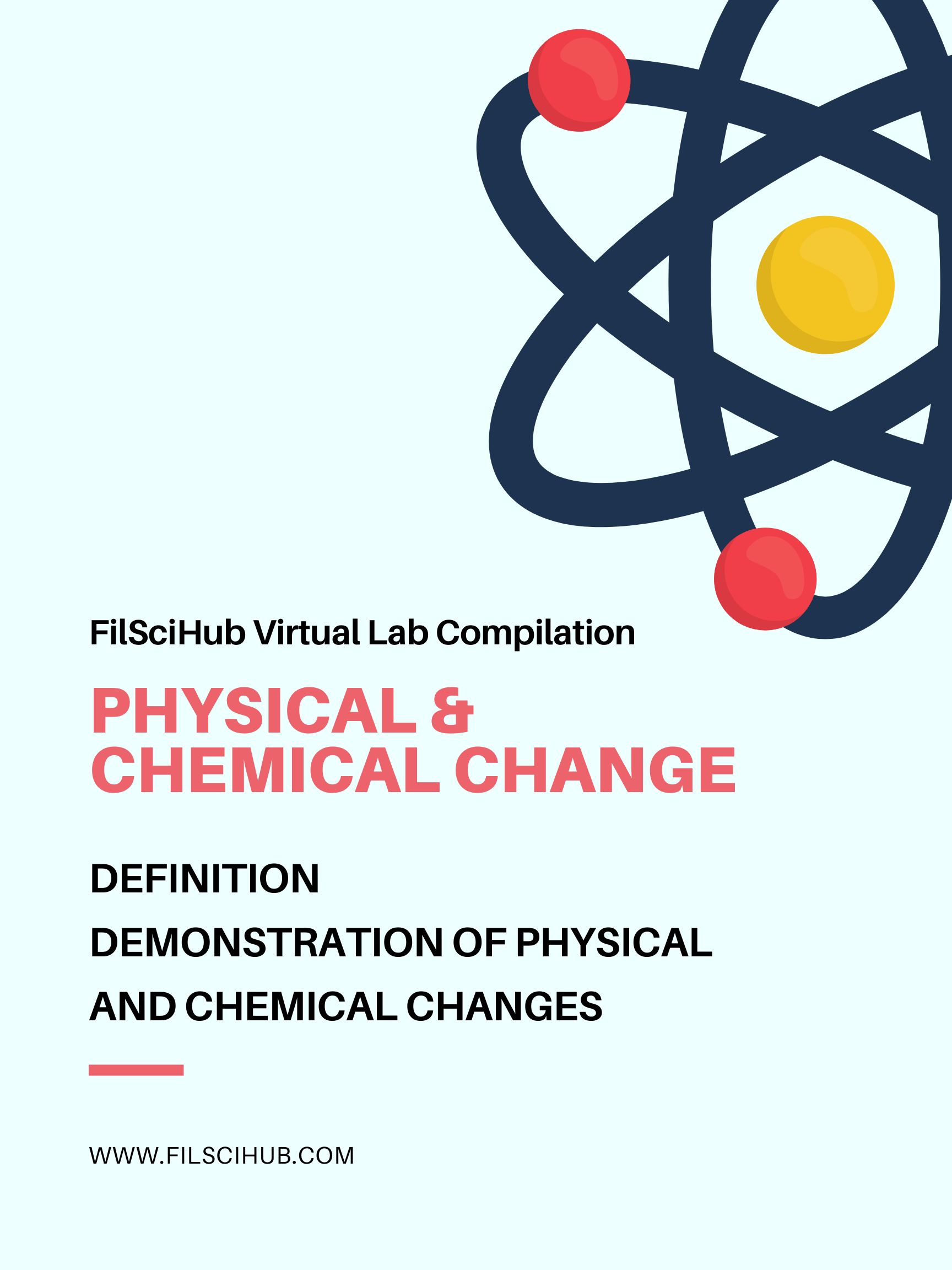
We compiled lecture videos and a recorded experiment for studying Physical and Chemical Changes: Definition and Examples. Plus a lecture video for introducing physical and chemical changes to kids!
DEFINITION: Physical and Chemical Changes
In this video we will learn about physical and chemical changes. We will go over several examples of each and then at the end of the video we will work on a ...
In this video I would like to talk about physical and chemical changes. Physical changes are changes in appearance only. A new substance is not created and n...
EXAMPLES: Physical and Chemical Changes
Jared uses a tablet, paper, and food to explain physical changes and chemical changes, while giving a few examples. Are you a teacher? Click this link: https...
Jared explains how chemical reactions can happen quickly or slowly. He does this with simple every day materials. Are you a Teacher? Check out our teaching r...
Physical & Chemical Changes for Kids
In chemistry, there are two main types of changes - physical changes and chemical changes. Physical changes affect the shape, size, and form of a substance. ...
Kickoff Session: Masterclass in Teaching Essential Math and Science High School Content
Back to Math Basics Session 3: Introduction to Calculus - Limits Part 2 (eCertificate)
One-Sided Limits
Existence of (two-sided) Limit
Limits at Infinity
Kickoff Session: Masterclass in Teaching Essential Math and Science High School Content
Back to Math Basics Session 3: Introduction to Calculus - Limits Part 1 (eCertificate)
Intuitive Notion of Limits
Rules on Evaluating Limits
Limits of Indeterminate Forms (using Factoring and/or Rationalizing the Expression)
To those who missed the LIVE session, you may watch the recorded tutorial via YouTube Live Streaming
Seminar Series: STEM Pedagogies for Special Education Students
Featuring teachers Carlisle Macahig and Maritess Andres.
This webinar series is for Pre-Service SPED Teachers, Teachers integrating SPED students in regular class, and Parents of SPED students
Back to Math Basics Session 5: Introduction to Calculus - Continuity of Functions
Continuity at a Number
Continuity of Polynomial and Rational Functions
Continuity of Transcendental Functions
Continuity on an Interval
Back to Math Basics Session 4: Introduction to Calculus - Limits Part 2
One-Sided Limits
Existence of (two-sided) Limit
Limits at Infinity
Back to Math Basics Session 3: Introduction to Calculus - Limits Part 1
Intuitive Notion of Limits
Rules on Evaluating Limits
Limits of Indeterminate Forms (using Factoring and/or Rationalizing the Expression)
Pedagogies in Teaching Math to Special Education Students - eCertificate
Featuring: Carlisle Cañete-Macahig, Teacher III, DepEd-Negros Oriental, Bacong Central School, Master of Arts in Special Education
Back to Math Basics - VECTORS
Featuring Jaysie Mher Tiongson, M.Sc. Assistant Professor, University of the Philippines
FREE online tutorial sessions for students and teachers Learn the basics and applications of Math Build essential skills you can apply in different fields
First Topic: VECTORS
Session 1: Dec 8, 9:30AM, Manila
Session 2: Jan 4, 9:30AM, Manila
a Zoom & Youtube live event
[BIOLOGY LABS] Basic Microscope Experiments: Operation of a Light Microscope and Onion and Cheek Cell Experiments

We compiled lecture videos and a recorded experiment for studying Basic Microscope Experiments: Operation of a Light Microscope and Onion and Cheek Cell Experiments.
Microscopes and How to Use a Light Microscope
Explore how to use a light microscope with the Amoeba Sisters! Includes microscope parts, how to use, and some helpful tips! Additionally, this video introdu...
This program is designed as a basic tutorial for students enrolled in Biology 10 who are first learning to setup and use lab microscopes. Produced by Technol...
Onion Cell Microscope Slide Experiment
Try not to cry while doing this experiment! Learn how to prepare an onion cell microscope slide! -- Sci Files posts all kinds of science videos, from experim...
Cheek Cells Under The Microscope
Human cheek cells are made of simple squamous epithelial cells, which are flat cells with a round visible nucleus that cover the inside lining of the cheek. ...
PROBLEM SET: Relationship between population growth and carrying capacity.
[BIOLOGY TEACHING Module] Classification of Plants
[BIO TEACHING MODULE] Heredity: Inheritance and Variation
Central Dogma: Flow of information from DNA to proteins: www.filscihub.com/community/blogpost-bio-module-central-dogma
Mutations and Abnormalities: www.filscihub.com/community/blogpost-bio-module-mutation-abnormalities
We also curated a PROBLEM SET that can be be used for class ASSESSMENT. You can access the PROBLEM SET and ANSWER KEY via the following LINK: www.filscihub.com/community/blogpost-bio-module-central-dogma-quiz.
Genetic Engineering: www.filscihub.com/community/blogpost-bio-module-genetic-engineering
Applications of Recombinant DNA: Vaccines, Gene Therapy, DNA fingerprinting & Genetically Modified Organisms (GMO): www.filscihub.com/community/blogpost-bio-module-taxonomy-domains-kingdoms-sn62x
We also curated a PROBLEM SET that can be be used for class ASSESSMENT. You can access the PROBLEM SET and ANSWER KEY via the following LINK: www.filscihub.com/community/blogpost-bio-module-gene-eng-ps.
[BIO TEACHING MODULE] Classifying Organisms - Taxonomy
[BIO TEACHING MODULE] Relationship between population growth and carrying capacity
PROBLEM SET: Relationship between population growth and carrying capacity.
[BIO TEACHING MODULE] Cellular Reproduction & Genetics
[CHEMISTRY LABS] Common Laboratory Glassware & Equipment PLUS SELF QUIZ

We compiled lecture videos and a recorded experiment for studying Common Laboratory Glassware & Equipment PLUS SELF QUIZ.
General Lab Safety
This Amoeba Sisters video introduces science lab safety guidelines with memorable illustrations and an accompanying handout listed under "safety" on http://w...
Common Laboratory Glassware and Equipment
Are you sure you're handling your glassware safely? Learn to identify the function of tools and equipment in a Chemistry Lab easily with this brief animated ...
A look at some of the common instruments and equipment that we will be using in class this year. Link to the handout mentioned in this lecture: https://goo.g...
Laboratory Equipment with Pictures and Examples! https://7esl.com/laboratory-equipment-vocabulary/ Lab Equipment List: * Tongs * Tuning fork * Stethoscope * ...
Important Glassware & Apparatus for High School Chemistry Labs
A List of Basic Chemistry Apparatus In most labs, you'll encounter the same basic apparatus. that's are--- Safety goggles and safety equipment Beakers Erlenm...
How to Clean Lab Glassware
Learn the correct laboratory glassware cleaning procedure for applications that need critically clean glassware. Watch and share Alconox Inc.'s latest traini...
Lab Equipment - Self Quiz
A self-quiz of all the lab equipment you are required to identify in preparation for the safety test for Intermediate Science.
Kickoff Session: Masterclass in Teaching Essential Math and Science High School Content
Back to Math Basics Session 3: Introduction to Calculus - Limits Part 2 (eCertificate)
One-Sided Limits
Existence of (two-sided) Limit
Limits at Infinity
Kickoff Session: Masterclass in Teaching Essential Math and Science High School Content
Back to Math Basics Session 3: Introduction to Calculus - Limits Part 1 (eCertificate)
Intuitive Notion of Limits
Rules on Evaluating Limits
Limits of Indeterminate Forms (using Factoring and/or Rationalizing the Expression)
To those who missed the LIVE session, you may watch the recorded tutorial via YouTube Live Streaming
Seminar Series: STEM Pedagogies for Special Education Students
Featuring teachers Carlisle Macahig and Maritess Andres.
This webinar series is for Pre-Service SPED Teachers, Teachers integrating SPED students in regular class, and Parents of SPED students
Back to Math Basics Session 5: Introduction to Calculus - Continuity of Functions
Continuity at a Number
Continuity of Polynomial and Rational Functions
Continuity of Transcendental Functions
Continuity on an Interval
Back to Math Basics Session 4: Introduction to Calculus - Limits Part 2
One-Sided Limits
Existence of (two-sided) Limit
Limits at Infinity
Back to Math Basics Session 3: Introduction to Calculus - Limits Part 1
Intuitive Notion of Limits
Rules on Evaluating Limits
Limits of Indeterminate Forms (using Factoring and/or Rationalizing the Expression)
Pedagogies in Teaching Math to Special Education Students - eCertificate
Featuring: Carlisle Cañete-Macahig, Teacher III, DepEd-Negros Oriental, Bacong Central School, Master of Arts in Special Education
Back to Math Basics - VECTORS
Featuring Jaysie Mher Tiongson, M.Sc. Assistant Professor, University of the Philippines
FREE online tutorial sessions for students and teachers Learn the basics and applications of Math Build essential skills you can apply in different fields
First Topic: VECTORS
Session 1: Dec 8, 9:30AM, Manila
Session 2: Jan 4, 9:30AM, Manila
a Zoom & Youtube live event
[PHYSICS LABS] Physics of Light Waves and Experiments on Reflection, Refraction and Diffraction
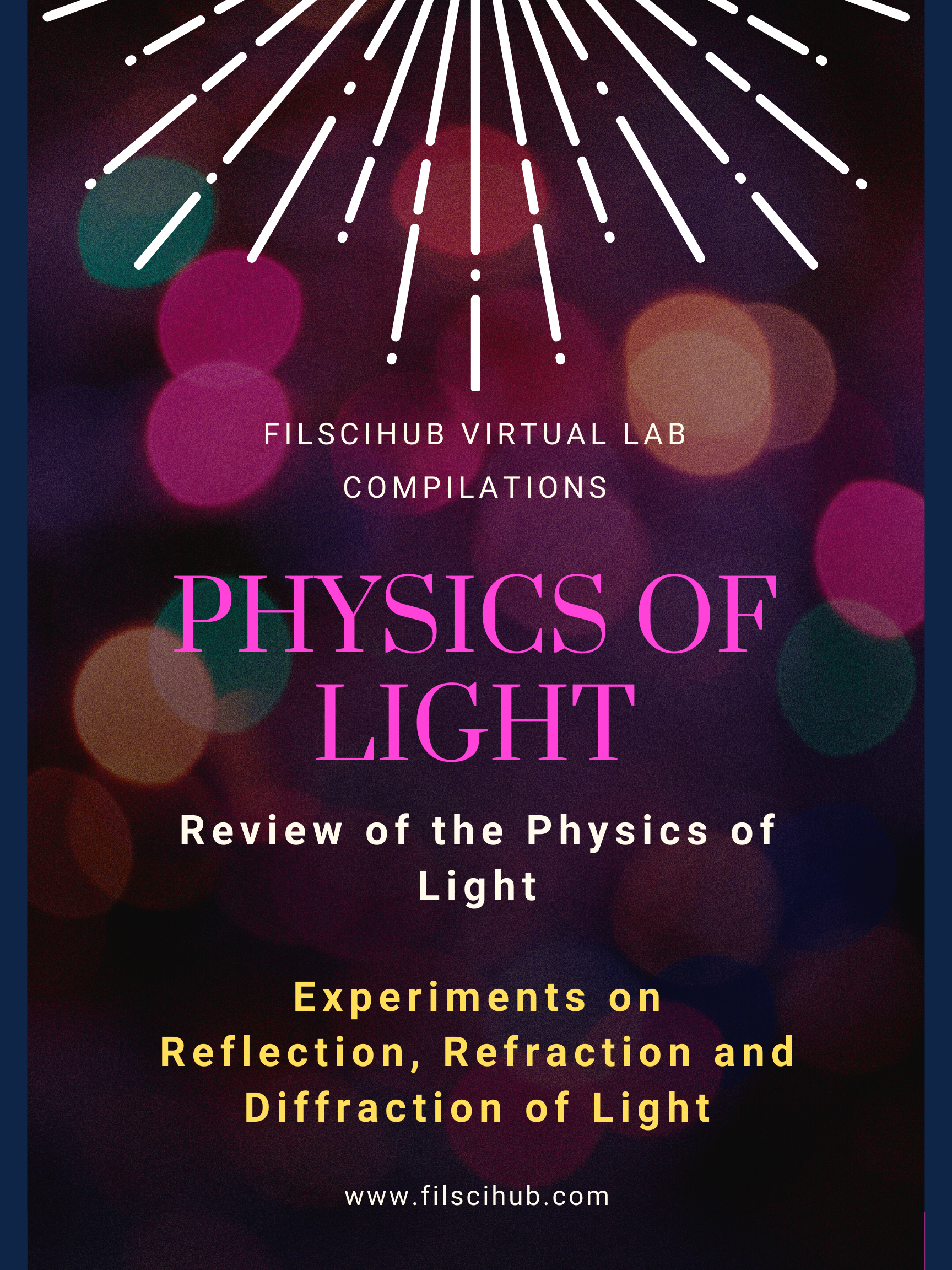
We compiled lecture videos and a recorded experiment for studying the Physics of Light Waves and Experiments on Reflection, Refraction andDiffraction.
Introduction to Light Waves
Hello Friends! Check out video on "Introduction to Light: It's types & Properties" by Letstute. This short video explains one of the most important thing aro...
In order to understand how we study the universe, we need to talk a little bit about light. Light is a form of energy. Its wavelength tells us its energy and...
Light Reflection Experiment
Through this experiment, you will learn about the Reflection From a Plane Mirror. To watch all subjects full videos click here: http://bit.ly/2O1ThGK
Experiment on Light Refraction
Refraction of Light through prism | Dispersion of Light explained | Science Experiments for kids Light Dispersion and refraction through prism. Have you ever...
Experiment on Light Diffraction
A laser will also diffract and interfere when shone through a diffraction grating. The distance to the first, second and third order maxima can be measured w...
Diffraction grating experiment - find the wavelength of the laser using the diffraction grating equation. Learn to carry out this experiment in 2 minutes. Mu...
We can see interference in action if we shine laser light through two slits onto a screen. Created by David SantoPietro. Watch the next lesson: https://www.k...
Kickoff Session: Masterclass in Teaching Essential Math and Science High School Content
Back to Math Basics Session 3: Introduction to Calculus - Limits Part 2 (eCertificate)
One-Sided Limits
Existence of (two-sided) Limit
Limits at Infinity
Kickoff Session: Masterclass in Teaching Essential Math and Science High School Content
Back to Math Basics Session 3: Introduction to Calculus - Limits Part 1 (eCertificate)
Intuitive Notion of Limits
Rules on Evaluating Limits
Limits of Indeterminate Forms (using Factoring and/or Rationalizing the Expression)
To those who missed the LIVE session, you may watch the recorded tutorial via YouTube Live Streaming
Seminar Series: STEM Pedagogies for Special Education Students
Featuring teachers Carlisle Macahig and Maritess Andres.
This webinar series is for Pre-Service SPED Teachers, Teachers integrating SPED students in regular class, and Parents of SPED students
Back to Math Basics Session 5: Introduction to Calculus - Continuity of Functions
Continuity at a Number
Continuity of Polynomial and Rational Functions
Continuity of Transcendental Functions
Continuity on an Interval
Back to Math Basics Session 4: Introduction to Calculus - Limits Part 2
One-Sided Limits
Existence of (two-sided) Limit
Limits at Infinity
Back to Math Basics Session 3: Introduction to Calculus - Limits Part 1
Intuitive Notion of Limits
Rules on Evaluating Limits
Limits of Indeterminate Forms (using Factoring and/or Rationalizing the Expression)
Pedagogies in Teaching Math to Special Education Students - eCertificate
Featuring: Carlisle Cañete-Macahig, Teacher III, DepEd-Negros Oriental, Bacong Central School, Master of Arts in Special Education
Back to Math Basics - VECTORS
Featuring Jaysie Mher Tiongson, M.Sc. Assistant Professor, University of the Philippines
FREE online tutorial sessions for students and teachers Learn the basics and applications of Math Build essential skills you can apply in different fields
First Topic: VECTORS
Session 1: Dec 8, 9:30AM, Manila
Session 2: Jan 4, 9:30AM, Manila
a Zoom & Youtube live event
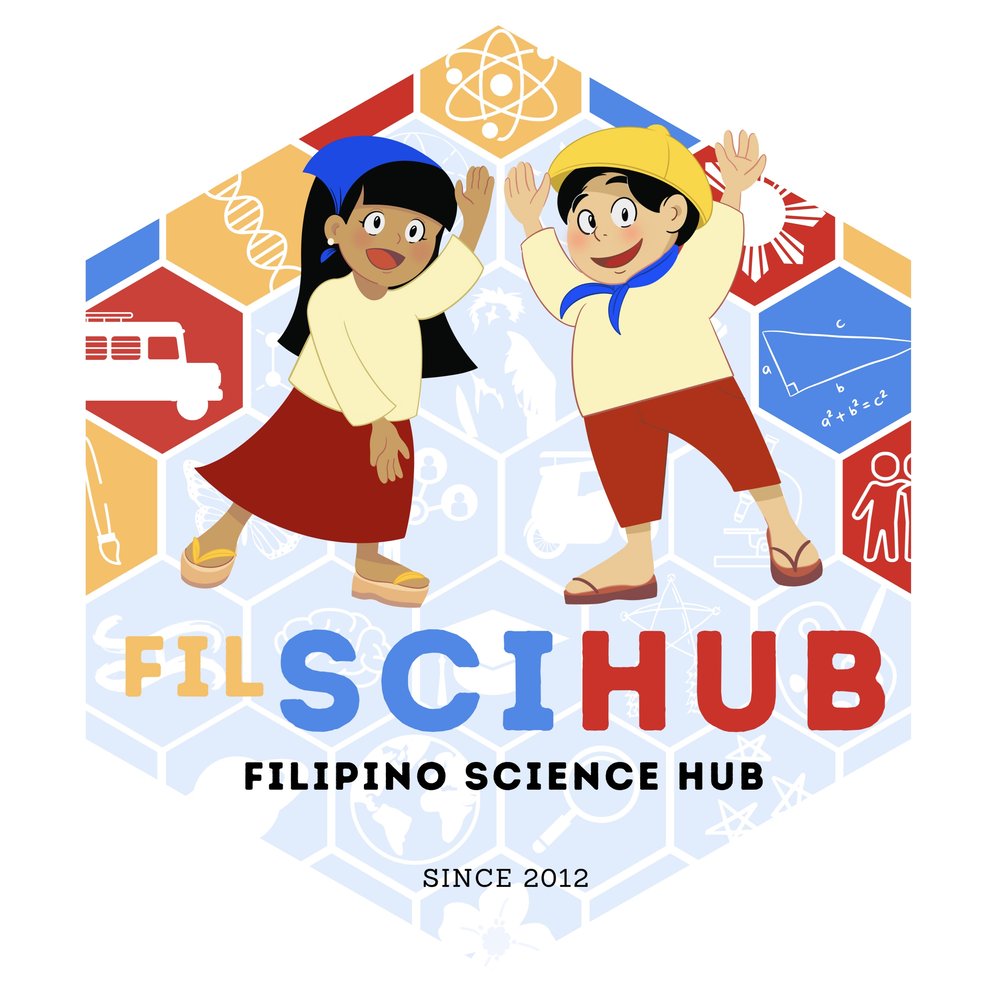
![[BIOLOGY TEACHING Module] Classification of Plants](https://images.squarespace-cdn.com/content/v1/5f02d28f35d64d2a5022eeb1/1618445519729-8PKVQ5Y3Z37NKD176PY4/1.png)
![[BIO TEACHING MODULE] Heredity: Inheritance and Variation](https://images.squarespace-cdn.com/content/v1/5f02d28f35d64d2a5022eeb1/1617146056763-300WU2TGUN7DE3UZU5CR/1.png)
![[BIO TEACHING MODULE] Genetic Engineering](https://images.squarespace-cdn.com/content/v1/5f02d28f35d64d2a5022eeb1/1616723002360-W2PL579DNMEOCLJ39GHL/1.png)
![[BIO TEACHING MODULE] Classifying Organisms - Taxonomy](https://images.squarespace-cdn.com/content/v1/5f02d28f35d64d2a5022eeb1/1616645882229-CEOTNLD2UVK999HBLDNO/1.png)
![[BIO TEACHING MODULE] Relationship between population growth and carrying capacity](https://images.squarespace-cdn.com/content/v1/5f02d28f35d64d2a5022eeb1/1615946394433-QBL74ZO2FAHDE8D1NP30/2.png)
![[BIOLOGY PROBLEM SET] Relationship between population growth and carrying capacity](https://images.squarespace-cdn.com/content/v1/5f02d28f35d64d2a5022eeb1/1615944361243-ZEIEPKUUJ72F8L5MD3D9/44.png)
![[BIO TEACHING MODULE] Cellular Reproduction & Genetics](https://images.squarespace-cdn.com/content/v1/5f02d28f35d64d2a5022eeb1/1614386284313-V91JZYDRRJ8CR9P1RNMY/1.png)
![[BIOLOGY] Stages of Mitosis](https://images.squarespace-cdn.com/content/v1/5f02d28f35d64d2a5022eeb1/1614388200672-GJQ6EFNCEE47FRNN2B8H/19.png)
![[BIOLOGY] Meiosis](https://images.squarespace-cdn.com/content/v1/5f02d28f35d64d2a5022eeb1/1614387709959-TQ25L6G5BTJ1HKR813KO/21.png)
![[Attendance] Kickoff Session: Masterclass in Teaching Essential Math and Science High School Content](https://images.squarespace-cdn.com/content/v1/5f02d28f35d64d2a5022eeb1/1742155988247-6AEQVFEX82LUGOO8HM7D/2.png)







PROBLEM SET: Relationship between population growth and carrying capacity.